
The United States Department of State (DOS), or simply the State Department, is an executive department of the U.S. federal government responsible for the country's foreign policy and relations. Equivalent to the ministry of foreign affairs of other nations, its primary duties are advising the U.S. president on international relations, administering diplomatic missions, negotiating international treaties and agreements, and representing the U.S. at the United Nations. The department is headquartered in the Harry S Truman Building, a few blocks from the White House, in the Foggy Bottom neighborhood of Washington, D.C.; "Foggy Bottom" is thus sometimes used as a metonym.
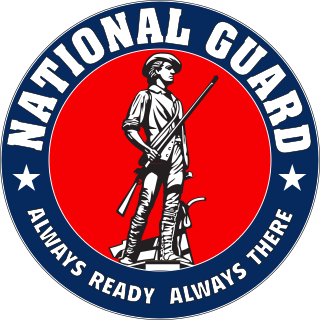
The National Guard is a state-based military force that becomes part of the U.S. military's reserve components of the U.S. Army and the U.S. Air Force when activated for federal missions. It is a military reserve force composed of National Guard military members or units of each state and the territories of Guam, the Virgin Islands, Puerto Rico, and the District of Columbia, for a total of 54 separate organizations. It is officially created under Congress's Article 1 Section 8 ability to "raise and support armies". All members of the National Guard are also members of the organized militia of the United States as defined by 10 U.S.C. § 246. National Guard units are under the dual control of state governments and the federal government.

The United States Department of Homeland Security (DHS) is the U.S. federal executive department responsible for public security, roughly comparable to the interior or home ministries of other countries. Its stated missions involve anti-terrorism, border security, immigration and customs, cyber security, and disaster prevention and management.
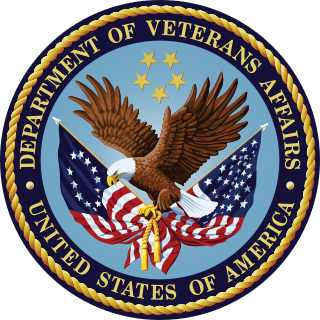
The United States Department of Veterans Affairs (VA) is a Cabinet-level executive branch department of the federal government charged with providing lifelong healthcare services to eligible military veterans at the 170 VA medical centers and outpatient clinics located throughout the country. Non-healthcare benefits include disability compensation, vocational rehabilitation, education assistance, home loans, and life insurance. The VA also provides burial and memorial benefits to eligible veterans and family members at 135 national cemeteries.

The Institute of Heraldry, officially The Institute of Heraldry, Department of the Army, is an activity of the Administrative Assistant to the Secretary of the Army solely responsible for furnishing heraldic services to the President of the United States and all Federal Government agencies. Title 18 of the United States Code, Chapter 33, Section 704 and Title 32 of the Code of Federal Regulations, Part 507 permit the institute to issue directives on how military insignia are displayed, the criteria for issuance, and how insignia will be worn on military uniforms.
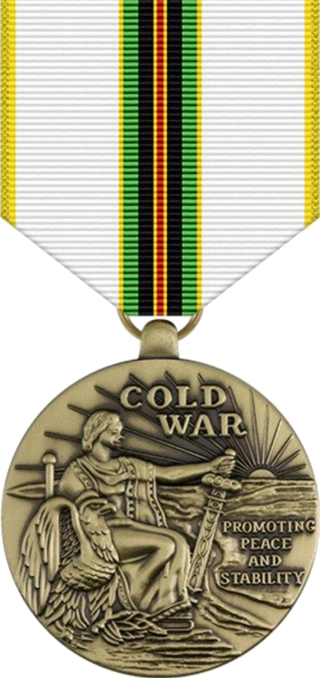
The Cold War Victory Medal is both an official medal of the U.S. National Guard and an unofficial military medal of the United States. It is awarded by the U.S. states of Louisiana and Texas, and in ribbon form only by the State of Alaska. In the medal's unofficial capacity it can be purchased, but not worn in uniform. It may be worn by any member of the United States military, or civilian employees of the federal government, who served in their positions honorably during the years of the Cold War, defined as lasting from September 2, 1945 to December 26, 1991.
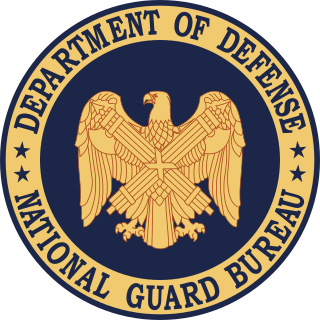
The National Guard Bureau is the federal agency responsible for the administration of the National Guard established by the United States Congress as a joint bureau of the Department of the Army and the Department of the Air Force. It was created by the Militia Act of 1903. The National Defense Authorization Act for Fiscal Year 2008, elevated the National Guard to a joint function of the Department of Defense. The 2007 NDAA, from the previous year, elevated the chief of the National Guard Bureau from a lieutenant general to a four-star general.
The Army of Puerto Rican Occupation Medal was a service medal of the United States Army which was created by order of the United States War Department on 4 February 1919. A retrospective award created decades after the action commemorated, the medal recognized Army service from 14 August through 10 December 1898 in Puerto Rico. The Army of Puerto Rican Occupation Medal was commemorative by nature although was approved for wear on active military uniforms. A similar medal, the Army of Cuban Occupation Medal was created for occupation service in Cuba following the Spanish–American War. The regulations for the Army of Cuban Occupation Medal were re-written to include regulations for the Army of Puerto Rican Occupation Medal.

Obsolete badges of the United States military are a number of U.S. military insignia which were issued in the 20th and 21st centuries that are no longer used today. After World War II many badges were phased out of the United States Armed Forces in favor of more modern military badges which are used today.

The military budget of the United States is the largest portion of the discretionary federal budget allocated to the Department of Defense (DoD), or more broadly, the portion of the budget that goes to any military-related expenditures. The military budget pays the salaries, training, and health care of uniformed and civilian personnel, maintains arms, equipment and facilities, funds operations, and develops and buys new items. The budget funds five branches of the US military: the Army, Navy, Marine Corps, Air Force, and Space Force.

Future Combat Systems (FCS) was the United States Army's principal modernization program from 2003 to early 2009. Formally launched in 2003, FCS was envisioned to create new brigades equipped with new manned and unmanned vehicles linked by an unprecedented fast and flexible battlefield network. The U.S. Army claimed it was their "most ambitious and far-reaching modernization" program since World War II. Between 1995 and 2009, $32 billion was expended on programs such as this, "with little to show for it".
Awards and decorations of the United States government are civilian awards of the U.S. federal government which are typically issued for sustained meritorious service, in a civilian capacity, while serving in the U.S. federal government. Certain U.S. government awards may also be issued to military personnel of the United States Armed Forces and be worn in conjunction with awards and decorations of the United States military. In order of precedence, those U.S. non-military awards and decorations authorized for wear are worn after U.S. military personal decorations and unit awards and before U.S. military campaign and service awards.
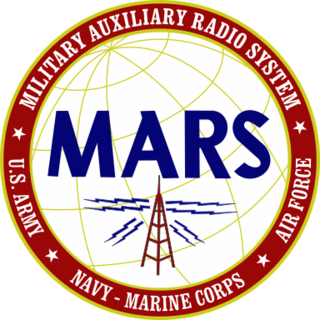
The Military Auxiliary Radio System (MARS) is a United States Department of Defense sponsored program, established as a separately managed and operated program by the United States Army and the United States Air Force. The United States Navy-Marine Corps program closed in 2015. The program is a civilian auxiliary consisting primarily of licensed amateur radio operators who are interested in assisting the military with communications on a regional and national level when access to traditional forms of communication may no longer be available. The MARS programs also include active duty, reserve, and National Guard units; and Navy, Marine Corps units.

In the United States, an American Indian tribe, Native American tribe, Alaska Native village, Indigenous tribe or Tribal nation may be any extant or historical tribe, clan, band, nation, or community of Native Americans in the United States. Modern forms of these entities are often associated with land or territory of an Indian reservation. "Federally recognized Indian tribe" is a legal term in United States law with a specific meaning.

Visitors to the United States must obtain a visa from one of the U.S. diplomatic missions unless they are citizens of one of the visa-exempt or Visa Waiver Program countries.
The same rules apply for travel to all U.S. states, Washington, D.C., Puerto Rico and the U.S. Virgin Islands, as well as to Guam and the Northern Mariana Islands with additional waivers, while similar but separate rules apply to American Samoa.
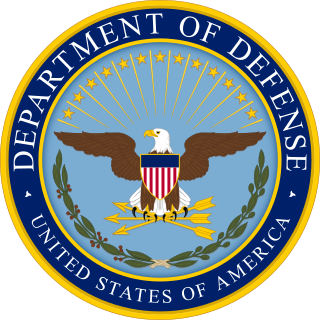
The United States Department of Defense is an executive branch department of the federal government of the United States charged with coordinating and supervising all agencies and functions of the U.S. government directly related to national security and the United States Armed Forces. As of June 2022, the U.S. Department of Defense is the largest employer in the world, with over 1.34 million active-duty service members, including soldiers, marines, sailors, airmen, and guardians. The Department of Defense also maintains over 778,000 National Guard and reservists, and over 747,000 civilians bringing the total to over 2.87 million employees. Headquartered at the Pentagon in Arlington County, Virginia, just outside Washington, D.C., the Department of Defense's stated mission is to provide "the military forces needed to deter war and ensure our nation's security".

The Washington Air National Guard (WA ANG) is the aerial militia of the State of Washington, United States of America. It is, along with the Washington Army National Guard, an element of the Washington National Guard.
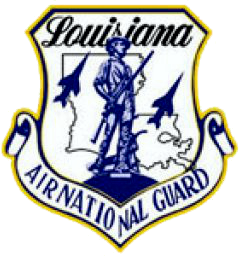
The Louisiana Air National Guard (LA ANG) is the aerial militia of the U.S. state of Louisiana. It is, along with the Louisiana Army National Guard, an element of the Louisiana National Guard.

The Office of the Inspector General(OTIG) serves to "provide impartial, objective and unbiased advice and oversight to the Army through relevant, timely and thorough inspection, assistance, investigations, and training." The position has existed since 1777, when Thomas Conway was appointed the first inspector. The department was reorganized many times, and almost abolished on several occasions. In its early days, the department was frequently merged with, or proposed to be part of the Adjutant General. It expanded greatly after the American Civil War, to the point that it had around 2,000 officers in 1993. The current holder of the position is Donna W. Martin.

Relations between Czechoslovakia and the United States refer to two periods in Czechoslovakia's history. The first being the establishment of Czechoslovakia after its declaration of independence in 1918 from Austria-Hungary initiated by President Woodrow Wilson as part of his Fourteen Points following World War I. The second period being the communist era from 1948 when relations were strained, until 1992 when Czechoslovakia split forming the independent nations of the Czech Republic and Slovakia as a result of the 1989 Velvet Revolution.


















